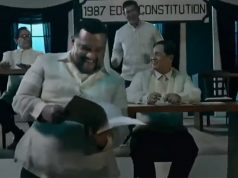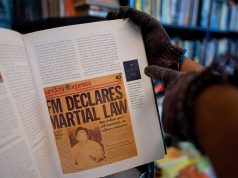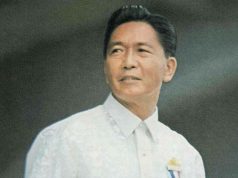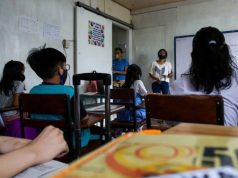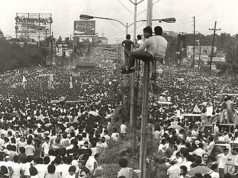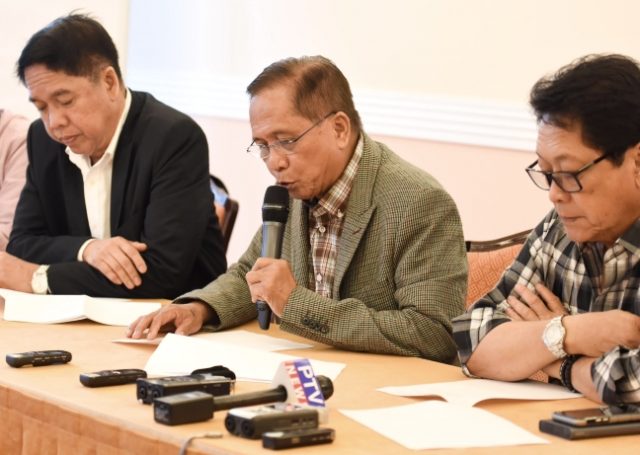
(UPDATE 5 – 8:49 a.m. May 28) Scrambling to save the fifth round of formal peace talks, the negotiating panels of the Government of the Republic of the Philippines (GRP) and the National Democratic Front of the Philippines (NDFP) meeting in The Netherlands have agreed to continue informal negotiations at 9 am Sunday, May 28, (3 pm Philippine time).
NDFP panel spokesperson Luis Jalandoni told reporters Presidential Peace Adviser Jesus Dureza requested for the postponement of the resumption of their panel-to-panel meeting originally scheduled at 8pm Saturday (4 am Philippine time).
The parties met at 6:30 in the evening (12:30 am Philippine time) for the NDFP to submit a written reply to the GRP’s statement that it would not participate in the fifth round of talks unless the Communist Party of the Philippines rescinds its earlier order to the New People’s Army to further intensify its military operations against state forces.
The NDFP also said the GRP asked them to sign a bilateral ceasefire agreement for the fifth round to proceed.
Reacting to the NDFP’s written reply, GRP chief negotiator Silvestre Bello III said the NDFP reply is “worth looking into.”
Both the NDFP and the GRP refused to divulge the contents of the reply, however, saying they have mutually agreed to keep the current informal negotiations between themselves.
Their early evening discussion was attended by the Third Party Facilitator, the Royal Norwegian Government.
The GRP and the NDFP are still trying to save what appeared earlier in the day to be an imminent cancellation of the round, sources from both parties said.
Bello and NDFP counterpart Fidel Agcaoili were seen holding backchannel talks in between panel-to-panel discussions in apparent efforts to save the formal round.
Earlier, Agcaoili said it is the third consecutive round the GRP presented conditionalities before the peace negotiations formally opened.
The GRP has been consistently asking the NDFP for a bilateral ceasefire agreement since the third round in Rome last January. The NDFP position, expressed repeatedly, is that such is only possible when socio-economic reforms as well as political and constitutional reforms agreements have already been signed and implemented in accordance with The Hague Joint Declaration of September 1, 1992.
5th round still possible
Both parties said the fifth round is still possible.
Earlier reports reaching Manila on Saturday, May 27, indicate that the 5th Round of the formal negotiations between the Government of the Philippines (GRP) and the National Democratic Front of the Philippines (NDFP) in Noordwijk aan Zee, The Netherlands has been put in suspended animation by a last minute conditionality that almost scuttled the talks, now best described as “in recess” as a result.
The respective panels of both sides promptly scrambled to troubleshoot the negotiation in order to try and salvage the peace talks.
The NDF Negotiating Panel said it was drafting a reply to its Government of the Republic of the Philippines (GRP) counterpart as part of efforts to find common ground, untangle the bind and allow the fifth round of formal peace negotiations to proceed.
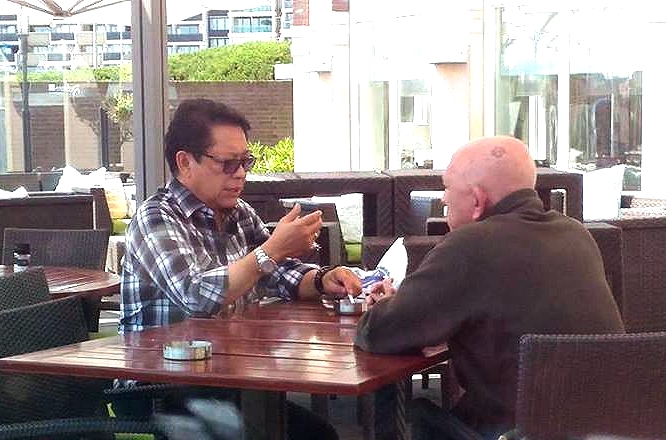
The government of the Philippines had announced it would not proceed with the scheduled 5th round of talks, through Presidential Spokesman Ernesto Abella “in the light of the latest public announcement by the Communist Party of the Philippines (CPP) to accelerate and intensify its attacks against the government due to the President’s declaration of martial law in Mindanao.
“We question the sincerity of the CPP/NPA/NDFP, if they truly are in pursuit of peaceful coexistence. The Duterte administration would rather pursue the path of genuine dialogue to build a nation worthy of its citizens.”
Abella’s statement wrong
GRP chief negotiator Silvestre Bello III, for his part, clarified that Presidential Spokesperson Ernesto Abella’s statement was wrong.
Abella’s announcement was lifted from Dureza’s prepared statement read to Filipino and Dutch journalists covering the talks.
Informed of Abella’s announcement, Bello looked surprised but underscored that such statements should come only from the government panel present in The Netherlands.
“The fifth round is still a possibility,” Bello maintained.
The panels are set to meet again in a last ditch effort to salvage the scheduled fifth round, Kodao Productions indicated in a dispatch as reported by Raymund B. Villanueva.
The CPP order to NPA
The CPP order had been in response to the intensified AFP operations and widespread human rights violations preceding and following the declaration of Martial Law in the whole of Mindanao.
President Duterte justified his Martial Law declaration by citing as reason the terrorist actions of the Maute Group in Marawi City.
But Lorenzana declared that the NPA was also a target of AFP military operations.
Silvestre Bello made a subsequent clarification that Duterte had said that the Mindanao martial law was not aimed against the NPA.
NDF reply
NDFP chief negotiator Fidel Agcaoili said their reply will clarify to the GRP the NDFP panel could not order the Communist Party of the Philippines (CPP) to retract its order to the New People’s Army (NPA) to further intensify their offensive operations against the Armed Forces of the Philippines and the Philippine National Police.
Agcaoili explained the CPP’s directive was a response to GRP Defense Secretary Delfin Lorenzana’s statements that the NPA was among the targets of President Rodrigo Duterte’s Martial Law declaration over the entire Mindanao region.
Agcaoili cited bombings of communities in North Cotabato and Bukidnon that killed one civilian and injured several others in the past two days.
“There are NPA units operating in those areas,” Lorenzana reasoned.
He added that the NDF could only recommend to the CPP in much the same way that GRP’s chief negotiator Silvestre Bello III and Presidential Peace Adviser Jesus Dureza could not order the AFP and the GRP security cluster to withdraw their all-out war policy against the NPA and lift President Rodrigo Duterte’s martial law declaration over the entire Mindanao region.
Agcaoili said they have gone as far as they could go in recommending to the CPP to reconsider its order to the NPA.
GRP’s cease fire demand
Agcaoili revealed the NDFP panel was also told by the GRP panel it wants a bilateral cease fire agreement signed during the fifth round.
“We have made our position clear that until we reach an agreement on social and economic reforms as well as political and constitutional reforms, there could never be a cease fire,” Agcaoili said.
“We hope they would receive our reply positively so that, hopefully, we can proceed with the opening ceremony of the fifth round tomorrow [Sunday],” Agcaoili said.
Presidential Peace Adviser Jesus Dureza says the negotiations were put in jeopardy by the decision of the Communist Party of the Philippines to order the NPA to intensify attacks in the face of the declaration of Martial Law in Mindanao.
“We question the sincerity of the CPP/NPA/NDFP, if they truly are in pursuit of peaceful coexistence. The Duterte administration would rather pursue the path of genuine dialogue to build a nation worthy of its citizens.”
Word reaching Manila from The Netherlands, indicated that the fifth round of formal peace negotiations had, indeed, hit a snag with the announcement by the government panel of its conditionality.
Mixed signals
This is the second time the GRP submitted to its counterpart a set of demands before a formal opening to a round of formal peace negotiations. For his part, the NDF’s negotiating panel chair Fidel Agcaoili reacted to the Abella statement: “This is contrary to what the GRP negotiators are saying here, after they submitted to us a copy of Dureza’s opening speech containing such a pronouncement. They [the GRP panel] are now clarifying that they are they are willing to sit down and find solutions to the problems. So, like everyone else, the NDFP is receiving mixed signals from the GRP. But we hope to know the real score in a couple of hours’ time.”
In a press briefing, the NDF panel said this demand by the GRP is a new one and it was not included in their April 6 Joint Statement that the fifth round of talks shall focus on the socio-economic reforms agenda.
NDF added that a signed bilateral cease fire agreement must only come after ground rules for its implementation have been forged by the parties: “We are supposed to be talking while fighting like the parties have successfully done in the past, especially during the Ramos regime.”
The status at the moment may best be described as a “recess” while both sides try to work out whether to proceed or not.- With Raymund B. Villanueva, Kodao Productions
Below are excerpts from two texts, from remarks already prepared prior to the last-minute snag that hit the talks.
OPENING REMARKS AT THE FIFTH ROUND OF FORMAL TALKS IN THE GRP-NDFP PEACE NEGOTIATIONS AT NOORDWIJK AAN ZEE
By Prof. Jose Maria Sison
Chief Political Consultant, National Democratic Front of the Philippines
May 27, 2017
We are riding on the momentum set by four successful rounds of talks and by unilateral meetings and bilateral consultations between rounds. We in the NDFP appreciate once more that President Duterte recently received and conversed with the Chairperson of the NDFP Negotiating Panel Fidel Agcaoili, Panel member Benito Tiamzon and Wilma Austria.
To stay on course in the peace process, we must firmly adhere to the major agreements that the GRP and NDFP have reaffirmed since the first round in August last year. We must follow the substantive agenda set by The Hague Joint Declaration and the Joint Agreement on the Sequence, Formation and Operationalization of the Reciprocal Working Committees.
We must assure all the openly known participants in the peace process of both sides and the holders of documents of identification that they are entitled to, protected by and enjoy safety and immunity guarantees under JASIG. It is highly desirable and necessary that all the participants in the peace process are not subjected to any kind or degree of duress, such as surveillance, harassment or threats of arrest or even worse.
We must resolutely comply with and diligently implement the Comprehensive Agreement on Respect for Human Rights and International Humanitarian Law (CARHRIHL). The hundreds of political prisoners listed by the NDFP must be released in the most expeditious manner. Even while in the mode of carrying out its all-out war policy, the GRP and its armed forces, police and paramilitary auxiliaries must be guided and bound by CARHRIHL. Likewise the NPA and the people’s militia must comply with CARHRIHL as they engage in self-defense and counter-offensives.
Frankly speaking, the NDFP is unwilling to engage in any kind of prolonged and indefinite ceasefire agreement before there are substantive agreements on social, economic, political and constitutional reforms which are significantly beneficial to the people. The NDFP does not wish to fall into the trap of capitulation and pacification, betraying the trust of the oppressed and exploited masses of the people. It also does not wish to preoccupy the peace process with accusations and counter-accusations of ceasefire violations and put aside the people’s demands for basic social, economic and political reforms.
The Filipino people and both the GRP and NDFP are aware of the fact that on February 5, 2017 GRP Secretary of National Defense Lorenzana declared an all-out war policy against the NPA. In this connection, President Duterte terminated the JASIG and in effect the entire peace negotiations. He also issued on March 7 the order to the AFP to use artillery fire and aerial bombing against the NPA on a nationwide scale. Despite the March 11 backchannel agreement for the GRP and NDFP to resume peace negotiations and to issue simultaneous and reciprocal unilateral ceasefire declarations, President Duterte did not order the issuance of the GRP declaration of unilateral ceasefire, according to a public statement of Lorenzana. The NPA has had no choice but to engage in self-defense and counter-offensives.
The cause of intensified fighting between the armed forces of the GRP and NDFP is the GRP all-out war policy and threat of martial law. It is wrong for anyone to blame the NPA and claim that it has gone out of the command and control of the Communist Party of the Philippines and the NDFP. The NPA maintains high fighting morale and iron discipline under the absolute leadership of the CPP. It is even more absurd to claim that the NDFP negotiating panel has lost its authorization from the NDFP to negotiate with the GRP negotiating panel and to make recommendations to the NDFP principal.
If the objective of the intrigue is to justify the GRP all-out war policy and extract a bilateral or joint ceasefire agreement ahead of any substantive comprehensive agreement on basic reforms, the GRP is practically terminating the GRP-NDFP peace negotiations or daydreaming that it can destroy the NPA by force of arms in the course of the peace negotiations. The NDFP Executive Committee has already informed the NDFP Negotiating Panel that the NPA is intensifying the people’s war under the absolute leadership of the CPP to resist and defeat the all-out war policy of the Duterte regime and the scourge of martial law for Mindanao and possibly for the entire Philippines.
However, in so many examples of successful peace negotiations in various countries, it is possible to negotiate while fighting goes on in the battlefield. We were able to forge the CARHRIHL in only six months in 1998, even as the civil war went on between the belligerent forces. It is possible to continue to accelerate the negotiations and forge the CASER within the current year and the CAPCR within the first quarter of the next year on time for the framing and ratification of a charter founding the Federal Republic of the Philippines.
It is preferable to accelerate the peace process rather than overburden or lay this aside with what the NDFP cannot accept: the negotiation of an interim Joint Ceasefire Agreement in violation of the substantive agenda set by The Hague Joint Declaration and the Joint Agreement on the Sequence, Formation and Operationalization of the Reciprocal Working Committees. While the civil war continues, the GRP and the NDFP can demonstrate their respective causes and fighting capabilities within the framework of CARHRIHL. The battles ought to prove that the peace negotiations are necessary.
A prolonged and indefinite interim joint or bilateral ceasefire agreement may be negotiated and drafted in advance but should not be signed and approved by the principals of the GRP and NDFP ahead of any of the substantive agreement even by a split second. We in the NDFP do not wish such a ceasefire agreement to preempt the substantive agreements, especially CASER. The NDFP also considers it desirable and necessary that the basic reforms are being implemented for at least two years before the permanent truce can be formalized in the Comprehensive Agreement on the End of Hostilities and Disposition of Forces.
It might be relatively easy for the GRP and NDFP Negotiating Panels to forge the CASER as a policy agreement. But it might be more difficult to obtain from GRP as annexes to the agreement the executive orders, legislation and constitutional amendments needed to implement CASER in view of the predominance of pro-imperialist and reactionaries within the different branches of the GRP and in view of their priorities which run counter to genuine land reform and national industrialization and which divert economic and financial resources from these.
The security cluster of the Duterte cabinet is interested only in the capitulation and pacification of the revolutionary movement through a combination of all-out war policy, martial law and a lopsided joint interim ceasefire agreement. The economic development cluster of the Duterte government is dominated by the neoliberals who oppose social and economic reforms. We refer to the problems in order to solve them.
If used by the Duterte regime to aggravate its all-out war policy against the revolutionary forces, martial law will increase the power of the pro-imperialists and reactionaries within the regime and will incite the revolutionary force and the broad masses of the people to intensify the people’s war. The only conceivable instance when the NDFP can agree with the Duterte regime on the proper use of martial law is when there is an alliance to combat the armed collaboration between US imperialism and local reactionary forces. Otherwise, the regime has to reckon and contend with a broad united front against a Marcos-type martial rule.
They are peace spoilers within and outside the Duterte regime who wish to impugn the credentials of the NDFP Negotiating Panel and the NDFP Chief Political Consultant. The fact stands that the principal of the NDFP Negotiating Panel is the NDFP National Council and its Executive Committee. These include the representatives of the Communist Party of the Philippines and the New People’s Army, with the former having command and control over the latter. They make their consensus on whatever policy and course of action to take in the GRP-NDFP peace negotiations by relying on the reports and recommendations of the NDFP Negotiating Panel to the NDFP National Council.
The major points that I have presented and stressed in these opening remarks come from the latest appraisal of the situation and the instructions that the National Executive Committee has given to the NDFP Negotiating Panel. The NDFP Negotiating Panel has no command and control over the NPA, just as the GRP Negotiating Panel has no such command and control over the AFP and PNP. But it provides to its principal the reports and recommendations as basis for decision-making.
The NDFP Negotiating Panel through its Chairperson will elucidate to its counterpart the latest instructions that it needs to know.
…………………………………………………………………………………
OPENING SPEECH FOR THE FIFTH ROUND OF THE FORMAL TALKS
By Fidel V. Agcaoili
Chairperson, NDFP Negotiating Panel
We in the NDFP Negotiating Panel have received a Directive from its Principal, the NDFP National Executive Committee.
Firstly, we have been directed to firmly adhere to The Hague Joint Declaration as the framework agreement for the GRP-NDFP peace negotiations. This Declaration sets forth the substantive agenda which aims to result in one comprehensive agreement after another on respect for human rights and international humanitarian law, social and economic reforms, political and constitutional reforms and the end of hostilities and disposition of forces.
The Declaration is reinforced by the Joint Agreement on the Sequence, Formation and Operationalization of the Reciprocal Working Committees. Thus, the subject of any prolonged and indefinite ceasefire or cessation of hostilities cannot be negotiated and agreed upon before the GRP and NDFP principals have signed and approved the Comprehensive Agreement on Social and Economic Reforms (CASER) and the Comprehensive Agreement on Political and Constitutional Reforms (CAPCR). The proper time to discuss a prolonged and indefinite ceasefire is when we reach the point of negotiating and agreeing on the Comprehensive Agreement on End of Hostilities and Disposition of Forces (CAEHDF).
If the NDFP agrees to put the subject of a prolonged and indefinite ceasefire ahead of CASER and CAPCR, it would fall into the trap of capitulation and pacification and it would be abandoning the substantive agenda which are aimed at addressing the roots of the armed conflict through agreements on social, economic and political reforms to lay the basis for a just and lasting peace.
Secondly, the NDFP must demand compliance with Comprehensive Agreement on Human Rights and International Humanitarian Law (CARHRIHL) – an already existing comprehensive agreement, especially in the face of certain violations. If the GRP does not comply with this comprehensive agreement, there would be no point in making further agreements.
In this regard, the NDFP raises the following prejudicial questions in demanding compliance with CARHRIHL.
1. Why are the political prisoners listed by the NDFP still being kept in prison in violation of the CARHRIHL and its provision on the Hernandez political offense doctrine as well as the Joint Agreement on Safety and Immunity Guarantees (JASIG)? There are expeditious remedies to set aright what is wrong.
2. Why is the GRP carrying out an all-out war policy, occupying communities, taking over civilian functions and using aerial bombs and artillery fire, against the people and revolutionary forces in violation of the CARHRIHL? The use of disproportionate force victimizes most the civilian population rather than the highly mobile guerrilla forces of the NPA.
3. Why are the NDFP Panel member and consultants to the peace talks continuously threatened and harassed?
4. Fourth, it must be pointed out that in raising these prejudicial questions, the NDFP is in no way attempting to hinder the peace talks. We must remember that the NDFP has no record of terminating the peace negotiations. A number of times, it was the GRP, under the Estrada, Arroyo, Aquino and Duterte regimes that has scuttled the peace negotiations, sometimes even without bothering to terminate the JASIG with the proper notice of termination given 30 days in advance.
At this point, the NDFP is faced with two possible reactions from the GRP.
One is that President Duterte may terminate the JASIG and the peace negotiations as he did last February 5 even before he could consult with his Negotiating Panel on February 20. In this event, the responsibility for the further escalation of the civil war will rest squarely on the GRP.
In truth, an all-out war has long been waged by the GRP against the revolutionary forces and people, despite the fact that there were unilateral ceasefire declarations.
As to the release of the hundreds of political prisoners, more than a year of negotiating with the Duterte government has thoroughly convinced the NDFP that the regime has no intention of releasing even the very small number of 15 it last mentioned. Instead, it is increasing the number of political prisoners and the concomitant violations of human rights and international humanitarian law. As of May 15, 2017 there are 403 political prisoners, 37 of them were arrested under President Duterte. There have been 59 cases of politically-motivated killings under President Duterte. In addition, there are tens of thousands of displaced persons all over the country as a result of military operations.
The recent martial declaration in Mindanao will surely lead to a burgeoning in the number of political prisoners and human rights violations.
The other possibility is that the GRP and NDFP continue to negotiate peace even while fighting continues in the battlefield. If this be the case, the NDFP remains willing to accelerate the peace negotiations and forge at the soonest time possible the comprehensive agreements on social and economic reforms and on political and constitutional reforms before the end of 2017 and early part of 2018, respectively.
Subsequently, the GRP and NDFP can discuss such subjects as the expeditious release of all political prisoners listed by the NDFP and a prolonged and indefinite ceasefire related to the implementation of all comprehensive agreements and the prospective end of hostilities and disposition of forces.
In any case, it is unacceptable to the NDFP for the GRP to insist on putting its demand for any joint or bilateral prolonged and indefinite ceasefire ahead of CASER and CAPCR in order to obtain the capitulation and pacification of the revolutionary forces and the people, and lay aside the substantive agenda and the ever urgent demands of the people for social, economic and political reforms necessary for achieving a just and lasting peace.
For its part, the CPP posted two articles on its web site articulating its position and perspective regarding the prevailing situation, as follows:
AFP offensives and atrocities in Mindanao heighten since declaration of Martial Law
Communist Party of the Philippines
27 May 2017
It would have been good if Bello were telling the truth that Duterte’s Mindanao Martial Law is only aimed against terrorists and not against the NPA or the people in general. The facts on the ground, however, belie Bello’s statements. The burden of proving such claims are heavy on the shoulders of Bello, as well as of key security and military officials of the Duterte government.
Prior to the declaration of Martial Law in Mindanao, the AFP has been carrying out intense armed offensives against the people and their revolutionary forces following the Duterte-Lorenzana declaration of “all-out war” against the NPA last February. Duterte has not rescinded this order .
Just this morning, we have received partial information from NPA operations commands in South, Far South and parts of North Central Mindanao that search and destroy operations, strike operations, shelling and occupation of peasant communities are being carried out intensively by the AFP against the NPA and the peasant masses in the following provinces:
1) Compostela Valley
2) Davao City
3) Davao del Sur
4) South Cotabato
5) Saranggani
6) Sultan Kudarat
7) North Cotabato
8) Bukidnon
These offensive operations have been heightened since the declaration of Martial Law. On May 24, AFP units carried out shelling and indiscriminate firing against peasant communities in Barangay Colon Sabak, Matanao, Davao del Sur. These areas are at least 180 kilometers from Marawi.
On May 25, on the second day of Duterte’s Mindanao martial law, hundreds of elements of the 39th IBPA dropped bombs, shelled and indiscriminately fired 50 caliber machine guns at dominantly Moro civilian communities in barangays Salat and Tuael in President Roxas, North Cotabato and barangays Tangkulan and Anggaan in Damulog, Bukidnon. These areas are at least 100 kilometers away from Marawi City.
Abdullah Pamansag, a resident of Barangay Salat, was killed as a result of the aerial bombardments. Several other residents, Norhamin Dataya, Cocoy Dataya, Alex Dataya, Nasordin Maman and Nor Taligapin have suffered severe injuries. At least 1,600 residents of the affected barangays were forced to evacuate their communities. Human rights organizations and relief workers are being prevented by the military forces from extending assistance to the residents.
The civil and political rights of the people in Mindanao are gravely being curtailed and trampled on by the all-out attacks against the people. Hundreds of people are being rounded up. People are being detained or stopped from travelling for having no identification cards. The military are threatening people against issuing statements or posting information on social media that may be deemed anti-government. Military and bureaucrats have issued guidelines restricting people’s rights to assemble and prohibiting them from staging protest actions. A martial law crackdown hangs over the heads of social activists.
The state of human rights is set to go from dismal to worse as Duterte himself has assured soldier that he has their backs as he urged them to rape and carry out abuses all they want against the people.
In light of these out and out attacks against the people and their revolutionary forces, NPA units are being left with little option but to undertake more and more tactical offensives in order to defend the masses and the people’s army by stopping the reactionary state armed forces from carrying out their onslaught.
It is in this spirit of defending the people’s rights against the AFP’s unmitigated fascist attacks that the CPP issued its May 24 declaration calling on the NPA to carry out more tactical offensives and urging the people to heighten their resistance against the imposition of martial law in Mindanao and demand its immediate lifting.
The Party has long declared its policy of fighting terrorism. The Party has consistently condemned groups that attack civilians. The revolutionary forces have long been against the Abu Sayyaf (and by implication, its supposed breakaway ISIS-linked or -inspired Maute Group) whose leaders collaborate with military officers in criminal activities. These groups use religious symbols to foment bigotry and violence against civilians in order to divide the Moro people and weaken their struggle for self-determination.
We must consider, however, the thick fog of disinformation which blankets the imposition of martial law in Mindanao. The AFP, andeven Duterte himself, has been spreading a lot of false information and fake news. Claims made by the AFP that the Amai Pakpak Hospital and the LaSureco (Lanao del Sur Electric Cooperative) were “taken over” by the “Maute Group” were exposed to be false. Even Duterte’s claim that a police officer was decapitated was also exposed as fake news. Information about the so-called Maute Group is largely based on the public speculations by the police, the military and Malacañang.
Beyond the information supplied by the AFP fake news mill, people no longer know who the real terrorists in Marawi City are. At this point, it would seem that it is the AFP and its intense aerial bombings and martial law policies are the bigger terrorists in the city, causing the people of Marawi grave sufferings and hardships.
………………………………………………………………………………
Martial Law in Mindanao: Atrocities and fake news
Communist Party of the Philippines
27 May 2017
On March 23, 10 p.m., officials of the Duterte regime announced GRP Pres. Rodrigo Duterte’s declaration placing the entire Mindanao under martial rule while in Moscow at 5 p.m. (Russian time). Since then, progressive organizations, concerned agencies and ordinary individuals have documented increasing cases of atrocities and human rights violations, including aerial bombings of civilian communities. Bearing the brunt of these bombings are the residents of Marawi City which the AFP have overran with armed personnel and tanks. Undemocratic measures, such as checkpoints, searches and arbitrary detentions, are intensified in Davao City and other centers of Mindanao. The violations are as follows:
#NotoMartialLaw #StoptheBombings #LiftMartialLawNow
Day 4, May 27
Elements of 66th IB who occupied the premises of Shin Sun Company in Compostela, Comval Province since May 26, barged into the picketline of the striking workers today (May 27) and threatened the workers that their “illegal” strike will be dispersed tomorrow (May 28) as ordered by their higher command.
KMP reports two peasant leaders arrested by 66th IB, PA in Maragusan, Compostela Valley.
Residents discover bodies of dead civilians inside homes destroyed by military air strikes in Marawi.
Restituto Padilla clarifies that the AFP “will enforce the law uniformly such that all violators of the law, regardless of group affiliations, will be dealt with accordingly.” This is after announcing “peace-inclined groups such as the MILF, MNLF and the NPA will not be affected by the ongoing military operations.”
Day 3, May 26
AFP aerial bombing by MG250 attack helicopters, shelling by 105 Howitzer cannons, firing by .50 cal machine gun in Sitios Pedtobawan, Campo, Apulan, and Centro in Brgy Salat, So. Libpas, Brgy. Tuael, all in President Roxas, and Brgys. Tangkulan and Anggaan in Dumulog, Bukidnon. One civilian killed, 5 wounded, more than 2,000 affected. This is 90 kilometers from Marawi.
Duterte to MLBT2: Trabaho lang kayo, ako na ang bahala… Pagnaka-rape ka ng tatlo, aminin ko na akin ‘yon [Just go to work, I’ll take charge… if you rape three, I’ll take the blame]…During martial law, your commanders, you can arrest any person, search any house, wala nang warrant. Kagaya noon, ASSO lang [no more warrant. Like before, just ASSO (Arrest Search and Seizure Order].
Restituto Padilla, AFP spokesperson, announces AFP will exercise the right to censure (sic), especially in social media. To netizens: control of posts in social media necessary.
Police Regional Office 11: Leaders and organizers of “anti-goverment” rallies will be arrested, more so if this will cause public disturbance. Under Martial Law, the writ of habeas corpus is suspended and they can directly arrest anyone who breaks the law.
News outlet GMA7 clarifies that Amay Pakpak Medical Center was never overrun by the Maute group, contrary to AFP report of a takeover on May 24
Day 2, May 25
Task Force Davao and PNP launched Oplan Bulabog at Brgy. 23-C, Davao City arresting 260 civilians only because they could not present IDs.
Davao City government releases 30-point guidelines for the curtailment of civil liberties.
1,800 families from Marawi who have evacuated since May 22 to the municipality of Sagiuaran, Lanao del Sur are suffering from hunger despite availability of food supply from DSWD because of tight and strict military checkpoints.
30 women composed of Lumad, women, Moro, pastors and churchworkers who gathered for an ecumenical forum were put under interrrogation for an hour by 6th Marine Landing Battalion in Brgy. Domulon, Sulatan Kudarat.
LaSurECo (Lanao del Sur Electric Company) management clarifies that the Lasureco office was never overran by the Maute, contrary to AFP report.
Sr Inspector Romeo Enriquez, Police Chief, Malabang, Lanao del Sur clarifies that he was never beheaded by the Maute, contraty to Duterte declaration
Day 1, May 24
Massive bombing of Marawi City, 1 child killed. Disorganized, massive evacuation of civilians ensue.
Shelling and bombing in Matanao, Davao del Sur, more than 120 kilometers from Marawi.




